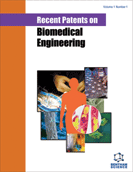Abstract
Successful cancer diagnosis and prognosis are significant for improving the cure rate of tumors and thus prolong the survival time of a patient. Numerous studies on in vivo and in vitro cancer detections have been pursued for quite a long time. For the early cancer screening, its final goal is to develop a precise, sensitive, rapid, less invasive, fully integrated, disposable, low-cost, and handy technique. Aiming to stimulate further researches along this important direction, the present article is dedicated to present a comprehensive review on the latest patents and technologies which might bring device prototypes into clinical practices even incubating homecare products in the near future. Some recent technical patents regarding early cancer detection with a focus on the in vitro detection (DNA, protein, and cells) were summarized. A thorough interpretation on their advantages and shortcomings were performed. Given each specific merit to the existing technologies, their integration would lead to synergistic effects which will help overcome the barriers facing many conventional methods. With future efforts through either explosive innovations on diagnosis principle or a combination between miniaturization strategy, microfluidic chip and nanotechnology, a multi-mode comprehensive detection which can better fulfill the urgent need in early cancer detection will be possible in the near future.
Keywords: Cancer diagnostics, early detection, circulating tumor cell, health care, microfluidics, lab on a chip.
 31
31

